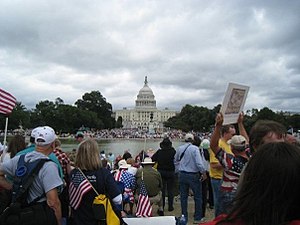Tea Party movement
From Wikipedia, the free encyclopedia
This article is about the political movement. For the protest events themselves, see Tea Party protests. For the U.S. Congressional caucus, see Tea Party Caucus.
|
|
This article's introduction may be too long for the overall article length. (September 2014) |

Tea Party protesters on the West Lawn of the U.S. Capitol and the National Mall at the Taxpayer March on Washington on September 12, 2009
| Part of a series on |
| Conservatism in the United States |
|---|
| Part of a series on |
| Libertarianism |
|---|
Demonstrators at the U.S. Capitol celebrated the movement's five-year anniversary in February 2014. Various polls have found that slightly over 10% of Americans identify as a member.[12]
The name refers to the Boston Tea Party of December 16, 1773.[13][14][15][16] Anti-tax protesters in the United States have cited the original Boston Tea Party as their inspiration.[17][18][19] References to the Boston Tea Party were part of Tax Day protests held in the 1990s and before.[20][21][22][23]
The origins of the current Tea Party movement can be traced back to circa 2007. The movement's beginnings were kick-started by Republican Congressman Dr. Ron Paul in 2007. His GOP presidential campaign received a 24 hour, record breaking, money bomb on December 16, 2007;[24] which is the 234th anniversary of the Boston Tea Party. This event directly contributed to creating a libertarian revival and divide in the Republican Party.[25][26][27] Ron Paul continues to be a prominent force in the Tea Party movement, such as endorsing Tea party candidates,[28] and also giving talks and speeches alongside prominent Tea party activist, and 2008 Vice Presidential candidate, Sarah Palin.[29][30] Sarah Palin has at times disagreed with Paul on foreign policy,[31] but eventually Sarah Palin changed her views on foreign policy and interventionism because of Ron Paul's inspiration and stance on limited government.[32] In 2012 she defended him against critics by saying, "[Paul's] the only one doing something about reining in government growth."[33] Ron Paul had a direct affect on changing other prominent Republican's beliefs on the Federal Reserve. Rick Perry, Mitt Romney, Sarah Palin and many others changed their views about the Federal Reserve after hearing Paul's opinions on the matter.[34]
No comments:
Post a Comment